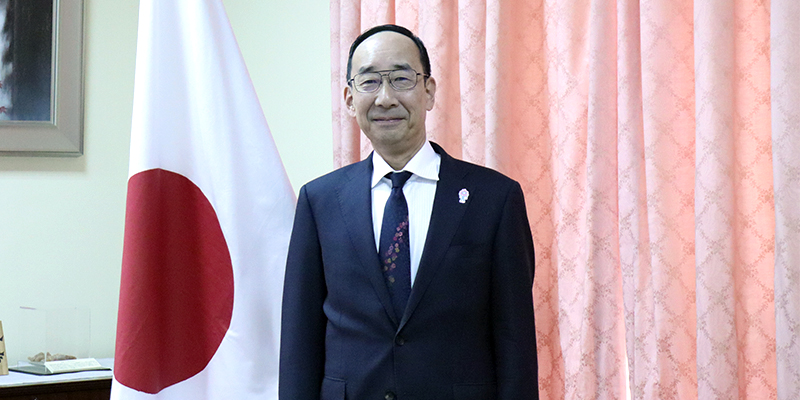
03 Apr Interview with H.E. Jota Yamamoto, Ambassador of Japan to Oman
JT: How does Japan’s partnership align with Oman’s Vision 2040, and what key areas of collaboration do you see driving this shared vision for economic progress and sustainability?
Yamamoto: Oman Vision 2040 focuses on diversifying the economy and fostering stability, transparency, and sustainability. Japan has long supported Oman, particularly in education and capacity building, with many Omani youth training in Japan. Strengthening people-to-people connections remains a priority. Economically, Japan and Oman share a deep partnership. Both are maritime powers with a common agenda for regional security, particularly in the Indian Ocean. Japan’s Maritime Self-Defense Force works closely with Oman, a reliable partner. The upcoming Indian Ocean Conference in Muscat will further amplify this cooperation. The friendship between Japan and Oman, symbolized by the imperial and royal families, ensures long-term collaboration for mutual prosperity.
JT: In light of the 2024 Oman-Japan Business Forum, how would you describe the current economic relationship between Oman and Japan, and what key areas do you see as central to further strengthening this partnership?
Yamamoto: Bilateral trade between Japan and Oman is steadily expanding, with a 19% increase in Japan’s exports to Oman and a 10.2% rise in Oman’s exports to Japan in 2024. This positive trend reflects the strength of our trade relationship. Japan and Oman have had a long partnership in the energy sector, particularly in crude oil and LNG, spanning more than 50 and 30 years, respectively. Now, we are looking to shift toward more sustainable cooperation, focusing on green hydrogen, ammonia, and other environmentally friendly uses of gas. Additionally, after a 30-year absence, Japan International Cooperation Agency (JICA) is returning to Oman in 2024, signaling renewed collaboration in the agricultural sector.
JT: How do the Embassy of Japan and the Oman Chamber of Commerce and Industry (OCCI) envision strengthening ties between the private sectors of both countries?
Yamamoto: Effective networking is crucial to enhancing business exchange. The OCCI has been instrumental in supporting Japanese business delegations, and we are grateful for their role. Currently, discussions are underway between Japan’s Ministry of Economy, Trade, and Industry (MITI) and Oman’s Ministry of Commerce, Industry, and Investment Promotion to establish a more structured framework, such as a business council or forum, to strengthen private sector ties.
JT: Can you elaborate on the outcomes of the recent Japan Cooperation Centre for the Middle East (JCCME) business mission to Oman and how it strengthens Japan-Oman economic relations?
Yamamoto: The recent JCCME mission, supported by Oman’s Ministry of Commerce, Industry, and Investment Promotion and the OCCI, was highly successful. We gained valuable insights into Oman’s proactive approach to decarbonization and economic diversification. Oman’s comparative advantages, including peace, stability, a strategic location, and abundant renewable energy resources, were highlighted. The mission facilitated deeper human connections and expanded collaboration areas. Topics like the Japan-GCC Free Trade Agreement, Japan-Oman Joint Crediting Mechanism, and Expo 2025 Osaka-Kansai were discussed and will be explored in upcoming business missions, including one by the Japan Business Federation to Oman, Saudi Arabia, and the UAE.
JT: How significant is Oman’s participation in Expo 2025 for strengthening its partnership with Japan, and what can visitors expect to learn about Oman’s progress in sustainability and innovation at the event?
Yamamoto: Oman’s proactive engagement in Expo 2025, led by His Highness Sayyid Theyazin, is impressive and will certainly broaden the scope of business cooperation between our two countries. Ministries and agencies across Oman are working together to showcase the country’s sustainability efforts, cultural heritage, and innovations. Key sectors like tourism, healthcare, pharmaceuticals, and digital applications, including e-games, are expected to see increased attention and collaboration.
JT: With Japan’s expertise in renewable energy and Oman’s focus on developing green hydrogen and ammonia technologies, how is Japan supporting Oman in its green energy transition?
Yamamoto: Japan fully supports Oman’s green energy transition, particularly its green hydrogen strategy, which aligns with both nations’ net-zero ambitions. Eight major hydrogen projects have been initiated in Oman, with Japanese companies committed to two. Given the current lack of a sizable international market for hydrogen, Japan and Oman are exploring domestic solutions. Mitsui & Co. and Kobe Steel are studying the production of direct-reduced iron (DRI) in Duqm using both gas and green hydrogen, potentially creating a significant domestic market. This project will be pivotal in shaping the future of Oman’s green hydrogen strategy. Additionally, the concept of E-Methane could allow green energy to be distributed through existing gas infrastructure, a potential area of interest for Japanese companies.
JT: Aside from the collaborations for oil and energy, how can Japan-Oman ties be strengthened in sectors like technology, helping Oman support key businesses throughout technological advancements?
Yamamoto: Oman’s Vision 2040 emphasizes building talented human resources, a focus Japan can support through educational exchange and capacity building. Japan’s long-standing cooperation in science and technology has created a strong foundation for future collaboration. Recently, the International Science Council’s General Assembly in Muscat highlighted Oman’s commitment to education, and Japan is eager to contribute further. Japan’s unique relationship with Oman, strengthened by the friendship between our Imperial and Royal families, continues to hold special significance. Mutual visits between our leaders could provide fresh insights and directions for advancing bilateral relations.
JT: Do you have any closing remarks for our readers who are considering visiting or investing in Oman?
Yamamoto: Japan’s relationship with Oman has long been one of mutual respect and trust, and it’s becoming even more significant in today’s global landscape. Oman’s stability and reliability make it a valuable partner, particularly in a region facing turmoil. Japan’s experience in green hydrogen and renewable energy can support Oman’s ambitious agenda. My advice to Japanese businesspeople is to leverage the strong existing connections and build on the shared achievements we’ve already made with Oman. Now is the time to look at this partnership with fresh eyes and take it to new heights.
